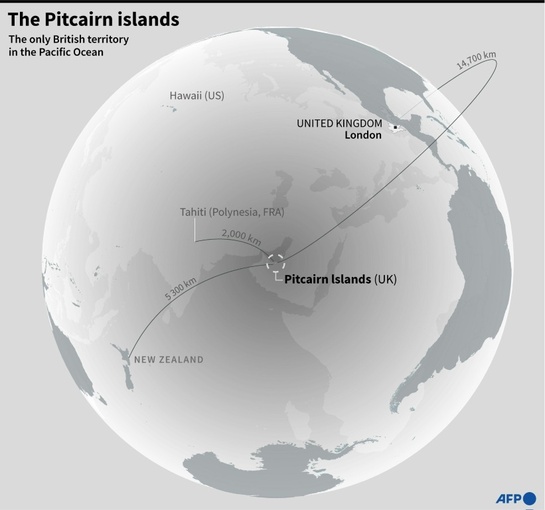The Pitcairn Islands, a volcanic outcrop halfway between South America and New Zealand, is the UK's only overseas territory in the Pacific Ocean and home to only 46 people.
One of the most remote places on Earth, all its inhabitants live in the capital Adamstown.
But even here, islanders have not escaped the drama that has dominated British politics since 2016 -- Brexit.
Pitcairn has its own well-equipped medical facility and a resident doctor.
For emergencies and longer-term conditions, however, the nearest hospitals are in French Polynesia, some 1,350 miles (2,170 kilometres) to the northwest, and New Zealand, 3,300 miles southwest.
With no access to the islands by air, that can mean at least two days' sailing, depending on weather conditions.
Pitcairn's mayor Charlene Warren fears vulnerable islanders could fall foul of restrictions usually associated with the length of time UK holidaymakers and those with second homes can stay in European Union member states.
"Brexit has definitely affected us for going to Tahiti (the largest island in French Polynesia) because we're no longer in the European Union," she told AFP.
"We're now only limited to three months in Tahiti, which with some medical issues that we have can roll over three months."
For Pitcairn's ageing population healthcare is a pressing concern, even with recent support from the government in London, particularly through Covid.

More than half of the remaining population will be aged over 60.
- Proud heritage -
The Pitcairn Islands were colonised in 1790 by the mutinous crew of the Royal Navy ship HMS Bounty, led by the master's mate Fletcher Christian.
Their actions, casting adrift the ship's captain William Bligh, have been immortalised in books and film.
Its people are descended from the mutineers and their Tahitian companions, whose history since has been one of hardy self-sufficiency.
On Pitcairn -- the only inhabited island of four scattered hundreds of miles across the ocean -- there is only one grocery store, open three times a week for two hours at a time.

King Charles III is head of state and the UK government is responsible for defence and foreign relations, controlling the 830,000 square kilometres (320,000 square miles) of sea around the islands.
The islanders have British passports, govern through an elected mayor and an island council, with a governor based in New Zealand.
But they are not part of the UK.
The islanders are proud of their Polynesian heritage, speak English and local language Pitkern.
"For me, I'm a Polynesian because I was born here," said policewoman Brenda Lupton Christian, 69, adding that she is a descendant of Fletcher Christian.
"This is my home, I wasn't born in England."
- Cast adrift -
Pitcairn depends on trade with the EU, especially the sale of rich, fruity island honey -- and wants access to EU markets.
But selling honey, stamps -- once so popular among philatelists that they supported two-thirds of the islands' budget -- and souvenirs to cruise ship passengers is no longer enough.

The territories, however, were not part of the Brexit trade and cooperation deal that cemented the UK's departure from the EU in January 2021.
That sparked concern about tariffs and the effect on the economies of the 14 British Overseas Territories scattered across the world.
Six were eligible for £69 million ($82 million) in European Development Fund cash to support infrastructure, tourism and education until 2014.
Pitcairn's share to support tourism was £2.2 million, according to a UK parliament report published in August into the effect of Brexit on British Overseas Territories.
Discussions are ongoing to substitute funding. Pitcairn will receive £8.6 million in UK budget assistance from March 2021 to March 2023.
But the territory does not have the right to negotiate or agree its own deal with the EU without the UK government's approval.
"We used to get some financial funds from the European Union. That has stopped as well with our ageing community," said Warren.
"It is a shame because it does affect us, but what can we do?
"We're only 46 people living in Pitcairn and our vote doesn't even count."
str-phz/lcm/ach
© Agence France-Presse
Your content is great. However, if any of the content contained herein violates any rights of yours, including those of copyright, please contact us immediately by e-mail at media[@]kissrpr.com.
Source: Story.KISSPR.com

